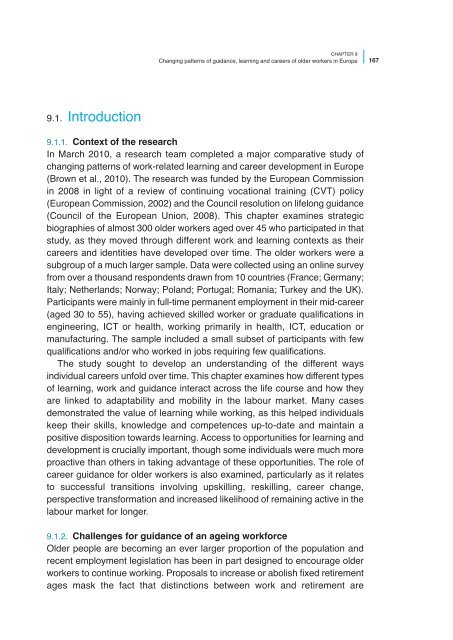Working and ageing - Cedefop - Europa
Working and ageing - Cedefop - Europa
Working and ageing - Cedefop - Europa
Create successful ePaper yourself
Turn your PDF publications into a flip-book with our unique Google optimized e-Paper software.
9.1. Introduction<br />
CHAPTER 9<br />
Changing patterns of guidance, learning <strong>and</strong> careers of older workers in Europe 167<br />
9.1.1. Context of the research<br />
In March 2010, a research team completed a major comparative study of<br />
changing patterns of work-related learning <strong>and</strong> career development in Europe<br />
(Brown et al., 2010). The research was funded by the European Commission<br />
in 2008 in light of a review of continuing vocational training (CVT) policy<br />
(European Commission, 2002) <strong>and</strong> the Council resolution on lifelong guidance<br />
(Council of the European Union, 2008). This chapter examines strategic<br />
biographies of almost 300 older workers aged over 45 who participated in that<br />
study, as they moved through different work <strong>and</strong> learning contexts as their<br />
careers <strong>and</strong> identities have developed over time. The older workers were a<br />
subgroup of a much larger sample. Data were collected using an online survey<br />
from over a thous<strong>and</strong> respondents drawn from 10 countries (France; Germany;<br />
Italy; Netherl<strong>and</strong>s; Norway; Pol<strong>and</strong>; Portugal; Romania; Turkey <strong>and</strong> the UK).<br />
Participants were mainly in full-time permanent employment in their mid-career<br />
(aged 30 to 55), having achieved skilled worker or graduate qualifications in<br />
engineering, ICT or health, working primarily in health, ICT, education or<br />
manufacturing. The sample included a small subset of participants with few<br />
qualifications <strong>and</strong>/or who worked in jobs requiring few qualifications.<br />
The study sought to develop an underst<strong>and</strong>ing of the different ways<br />
individual careers unfold over time. This chapter examines how different types<br />
of learning, work <strong>and</strong> guidance interact across the life course <strong>and</strong> how they<br />
are linked to adaptability <strong>and</strong> mobility in the labour market. Many cases<br />
demonstrated the value of learning while working, as this helped individuals<br />
keep their skills, knowledge <strong>and</strong> competences up-to-date <strong>and</strong> maintain a<br />
positive disposition towards learning. Access to opportunities for learning <strong>and</strong><br />
development is crucially important, though some individuals were much more<br />
proactive than others in taking advantage of these opportunities. The role of<br />
career guidance for older workers is also examined, particularly as it relates<br />
to successful transitions involving upskilling, reskilling, career change,<br />
perspective transformation <strong>and</strong> increased likelihood of remaining active in the<br />
labour market for longer.<br />
9.1.2. Challenges for guidance of an <strong>ageing</strong> workforce<br />
Older people are becoming an ever larger proportion of the population <strong>and</strong><br />
recent employment legislation has been in part designed to encourage older<br />
workers to continue working. Proposals to increase or abolish fixed retirement<br />
ages mask the fact that distinctions between work <strong>and</strong> retirement are

















